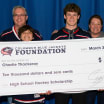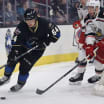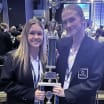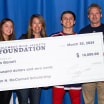By his own calculations, Donald Jakeway can think of about 40 times in World War II when he should have died.
It goes well beyond the time he parachuted into German-occupied France in the hours before the Normandy invasion, or the time a Nazi sniper's bullet pierced his lung, then his ambulance rolled off the side of a mountain, killing everyone on board except Jakeway.
There was the time "Jake" was commanded to lead a unit tasked with taking a hill that overlooked a key road in northern France, only to be ambushed by fire from the Hitler Youth. Or the time he was fighting in the Ardennes during the Battle of the Bulge and looked up to find a sniper's rifle pointed right at him, a trigger pull away from death.
World War II veteran honored by Jackets still calls central Ohio home
96-year-old Donald Jakeway receives Elk & Elk Military Salute during Boston series
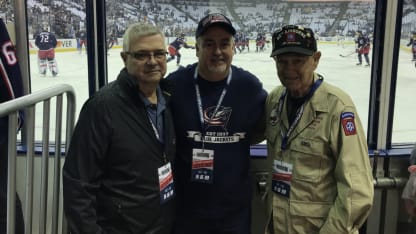
"I've been a very fortunate man," said Jakeway, who somehow survived all of those circumstances in his nearly three-year career in the U.S. Army.
The #5thLine gave 96-year-old World War II veteran Donald Jakeway quite the welcome tonight.#CBJ | #StanleyCup pic.twitter.com/r6N5BllOPg
— Columbus Blue Jackets (@BlueJacketsNHL) May 7, 2019
Jakeway, now 96, has lived up to the promise he made during the war to be a family man and a community booster since he returned to his hometown of Johnstown, Ohio.
He spent the last seven decades raising four children with his wife of nearly 73 years, Roselyn. He built the city's high school football stadium and Little League field, and there's enough things named after him in town that they could just change the name of the Licking County village to Jakestown.
Yes, it's been a remarkable life for Jakeway, who was one of the World War II veterans honored by the Blue Jackets during their playoff run.
Jakeway was in Nationwide Arena for Game 6 of the series vs. Boston for his first-ever hockey game, serving as the Elk & Elk Military Salute honoree who stood beside Leo Welsh for the national anthem and then was honored during one of the first-period media timeouts.
From the battlefields of Europe his civilian life in Johnstown, Jakeway has spent his life making a difference. So it was fitting that he was one of three World War II veterans recognized -- and celebrated via thunderous applause -- in Nationwide Arena during the Boston series.
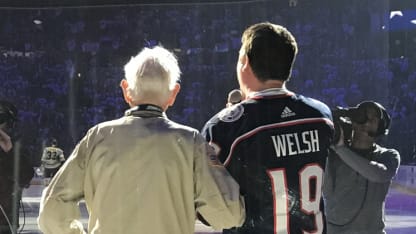
© Honor Flight Columbus
Even the Blue Jackets players couldn't help but tap their sticks for the sacrifice of those who came before.
"It's a special moment," said forward Cam Atkinson, whose Force Network Fund raises money for charitable organizations that benefit military and first responders. "It's no secret I give back to first responders and military, and to have those guys, it's just humbling.
"It puts things into perspective, and ultimately it's those guys who put their lives on the line every single day and it allows all of us to live with freedom and play hockey. We owe it all to those guys."
It's fair to say Jakeway had a very different life than most youngsters in the 21st century. At age 19, he enlisted in the U.S. Army on Nov. 28, 1942, and became an original member of the celebrated 508th Parachute Infantry Regiment of the 82nd Airborne Division.
After extensive training in both the U.S. and overseas, the 508th was tasked with being the first American boots on the ground in the Normandy invasion. Jakeway parachuted into German-held territory in northern France in the hours before the boats came ashore on the beaches, landing in a tree near Chef-du-Pont outside of Sainte-Mère-Église, in the yard of St. Claire Chapel and about 50 yards from a German bivouac.
"When I jumped, it wasn't pitch black, but it was a dark night," remembers Jakeway, who was separated from his unit upon landing. "I could see all this water below me and I didn't want to land in that. They had flooded the Merderet River and dammed it up. For 10 miles they had nothing but water. I started pulling on my riders and I landed on a tree in this church, scared to death, hanging in a tree there, and I couldn't get unbuckled so I got my trench knife out and cut those suspension lines and dropped to the ground.
"I got over the hedgerow and I had this clicker (American forces used to find one another), and I thought, 'I don't want to sit out here in the dark clicking that thing. If the Germans can hear that, it might be a little suspicious,' so I threw it away."
Jakeway eventually did reunite with his unit and fought the German troops until mid-July, when the unit returned to England missing more than half of its original troops.
He went on to make his second combat jump into Holland in September, 1944. Days after landing, he was leading a patrol in the den Huevel Woods, fighting house to house, when the unit discovered and liberated a Jewish family, the Jakobs, who had been hiding from the Nazis in an attic for 25 months.
Jakeway stayed in touch with Edith Jakobs over the years and met her brother Bert Jakobs, who was 10 years old at the time of the liberation, in 2011.
"We didn't know they were in that building," Jakeway says now. "I enjoy (Bert's) story because I didn't know many parts of it. He calls me now and says they lived on onions, potatoes and turnips. That's what they lived on in this little farm. (The Dutch family) couldn't buy them groceries, the Germans would get suspicious.
"I said (to Bert), 'Well, how do you like potatoes now?' He says, 'Nah, I like pizza.'"
From there, though, the rest of Jakeway's time in Europe was marked by peril. Shortly after liberating the Jakobs family, Jakeway was severely wounded by German artillery shrapnel in the face, head, neck, and back near the town of Beek in The Netherlands.
He was released from the hospital with 92 points -- 85 were required to go home -- but he chose to stay with his unit to fight in the Battle of the Bulge in Ardennes Forest, shielding the Allied forces near Werbomont.
On Jan. 31, 1945, he was shot by a German sniper through a lung while on patrol to neutralize a German tank. On the way to the hospital the driver lost control and rolled the ambulance off the side of a mountain, killing everyone on board except Jakeway. He was rescued, recovered and released from service at Memphis General Hospital on Aug. 25, 1945.
That was it for his service, but there were other close calls as well for Jakeway. In July, 1944, he was commanding a unit of 24 American soldiers who were ordered to take a hill overlooking a critical road, only to find the field was full of mines. Soon, the American soldiers were under fire from a Hitler Youth division in a frontal attack.
"Instead of going backward, I ran over to this hedgerow and I thought, 'I'm never going to make it,'" he said. "I could see the machine gun firing up about 200, 300 yards up on the hill, and I emptied my M1 (rifle) into that. Believe it or not, the firing quit. There were no birds, no wind. It was a deep silence. How I got through that, I'll never know."
Then, on a cold winter's night in the Battle of the Bulge in the Ardennes, he could sense something was wrong.
"I kept looking around, and no farther than (30 feet away) right there laid a German sniper pointing his rifle at me," Jakeway said. "All he had to do was pull his trigger and he could have killed me. Why he didn't shoot me, I don't know. Whether I surprised him by speaking some German to him or what, I don't know what it was. Amazing."
When Jakeway returned to central Ohio, he was honored as a hero. For his military service, he has been awarded with four Bronze Stars, two Purple Hearts, The French Medal of Honor, the Distinguished Service Award (France), the Orange Lanyard (Holland), and numerous other medals/awards, including an induction last year into the Ohio Military Hall of Fame.
Jakeway poured much of his life into his family and serving his community upon returning home. One of six children himself, he had promised his daughter he'd work for the betterment of Johnstown and did just that. In addition to building the local playing fields, he served as a coach for local children in multiple sports. Jakeway also has served as Johnstown Village Council president and worked with the Kiwanis Club and the American Legion.
On the family front, he raised sons Donnie, David and Kim and daughter Denise. Kim, who served as the principal of Johnstown-Monroe High School but now is battling his way back from a stroke suffered in November, joined David with the elder Jakeway at Nationwide Arena for Game 6.
"He's a strong-willed man, I'll tell you," Jakeway said of Kim. "I'm so proud of him."
Over the past few decades, Jakeway has dedicated himself to telling the story of the heroism that helped the United States win the war. His book "Paratroopers Do Or Die" is a compilation of his insight into what it took to win World War II. A few years ago, Bert Jakobs traveled to central Ohio and the two made appearances at local schools to discuss their experiences in World War II, and Jakeway continues to visit groups across central Ohio and the country for speaking engagements.
One of the take-home messages of his efforts is something many Americans likely forget now that the War is three-quarters of a century in the rearview mirror: Just how close World War II was to being lost and what it took to win it.
"This country doesn't realize how close we came to losing that war," Jakeway said. "You think about it for a minute, how close they came. To have been part of that (effort), like I always say, there's no one individual, there's no one company, no one regiment or division that won the war. It took all of us."






